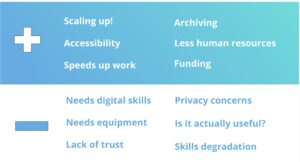Setting: AI4GOV Master, Project Work 3
Lead by: Ilaria Mariani (Department of Design, Politecnico di Milano; ORBIS coordination team) and Oscar Corcho (Universidad Politécnica de Madrid), with Riccardo Ventura (Department of Design, Politecnico di Milano)
📅 Date: 11 March 2025
🎤 Guest lecturer: Berta Mizsei, Researcher at CEPS
Guest: Berta Mizsei
Berta Mizsei is a researcher at the Centre for European Policy Studies (CEPS), specializing in public participation, digital services, and democracy in the EU. Her work focuses on the ethical, legal, and socio-economic aspects of emerging technologies and their impact on governance.
By leveraging a combination of qualitative and quantitative research methodologies, including workshop facilitation, foresight studies, and survey analysis, she provides crucial insights into how AI can enhance citizen engagement in policy making

In her keynote, Berta Mizsei addressed how AI-driven tools can be leveraged to enhance citizen participation in EU policy making. She emphasised the significance of digital deliberation, explaining how AI can bridge the gap between citizens and policymakers, ensuring that decision-making is more transparent, inclusive, and data-driven.
Key Discussion Points:
- Challenges in Digital Participation – Issues such as trust, accessibility, and digital skills gaps must be addressed to ensure effective e-governance.
- AI’s Role in Deliberative Democracy – How AI can be used to enhance active listening and foster more dynamic, large-scale citizen engagement.
- The Ethical and Legal Framework – Considerations regarding privacy, data protection, and inclusivity in AI-enhanced democratic tools.
The keynote was followed by an interview conducted by the Master cohort, structured to gather insights on the needs and challenges faced by two primary groups: moderators and policymakers. The interview addressed critical topics, including the representation of contributions in debates, the impact of citizen input on policy making and the importance of communicating initiatives and embracing diversity. Furthermore, the barriers posed by digital literacy to e-participation, the essential role of moderation were discussed and ultimately the interview broadened the discussion to emphasize the importance of creating productive environments that foster inclusive debates while ensuring credibility and accountability.

In figure, the phases of identification and prioritisation of questions for the user interview aimed at gathering needs, challenges, expectations.
Key Takeaways
- AI can enhance democracy by enabling large-scale, data-driven public participation.
- Trust and inclusivity remain key challenges that must be addressed for AI-enhanced governance tools to be effective.
- Collaboration between researchers and policymakers is essential to align AI innovations with public needs.
Concluding thoughts
The session provided an inspiring perspective on the intersection of AI and public participation, demonstrating the relevance of integrating citizens and stakeholders for informing the design ofAI-enhanced tools, these initiatives are paving the way for a more desirable, inclusive, transparent, and data-driven democracy.
| Challenge
Digital participation tools face accessibility barriers, requiring strong public engagement strategies. |
Opportunity
AI-powered active listening can enhance citizen input in decision-making, leading to more transparent and responsive governance. |
Stay tuned for upcoming developments in Project Work 3, where AI-driven solutions will continue to evolve in response to emerging governance needs!
